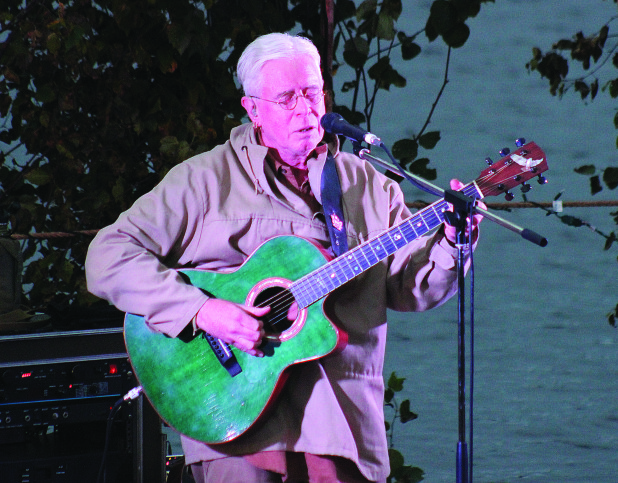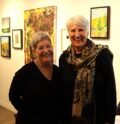Archive » Headline News » News
Cockburn communicates compassion through his music
August 19, 2014

By Nate Smelle
There is a naturally enchanting quality to the music and lyrics of Bruce Cockburn that connects with Canadians in a special way. Through his songs he paints vivid pictures that reveal both his love for the natural world and his outrage against its abuse. His hauntingly happy melodies fit perfectly with the remote wilderness setting of the Bone Lake Amphitheatre in the Haliburton Forest and Wild Life Reserve on Aug. 17. Echoing gently across the water his smooth and soothing sound held the audience of more than 700 people spellbound for more than two hours during the finale of this year’s Forest Festival. Cockburn performed classics such as Stolen Land, Call it Democracy, Wondering Where the Lions Are, and Mama just wants to barrelhouse all night long.
When the music was over Cockburn made his way from the floating stage and up the hill to meet with his fans. After the crowd shuffled back through the forest to their vehicles, the Canadian music icon reflected upon his experiences as an artist and an activist.
“For me the music comes first,” Cockburn said.
“It has been my good fortune to have been raised with a degree of awareness of what is going on in the world, and with a degree of concern.”
Drawing inspiration from his first-hand experiences of war, poverty and ecological destruction around the planet his words share an honest perspective of a world that is both beautiful and troubled. Somehow whether he is singing about Where the Death Squad Lives in Guatemala, or If a Tree Falls, Cockburn is able to communicate his impression of the world within and outside of him in a way that is distinctly Canadian. An attentive observer of culture and nature he sees it as his responsibility to share these observations in his art.
“My job as I see it, is to say what I see,” said Cockburn.
“Not everyone wants to look at the things I like to look at, so that makes me different from some people. I chose to go to Central America in the early 1980s because I was curious, because I wanted to see what was going on up close. I went to Baghdad and Afghanistan for the same reason.”
Cockburn said that although many of his lyrics evoke a feeling of empathy and concern for the suffering of others his motivation to make meaningful music is partially for his own benefit.
“I want to understand the human experience as much as I can, and I want to write about it,” he said.
“Unfortunately the human experience includes some really awful [stuff], and sometimes that ends up in songs. It makes for dramatic song material, but songs like that also provide an opportunity to air the issue in a broader way than it might be being aired.”
Cockburn is planning to put his words and music into action on behalf of environmentalist David Suzuki’s cross-country Blue Dot Tour. He is scheduled to perform on the tour in Edmonton on Oct. 28. Joining the likes of Neil Young, Jim Cuddy and Greg Keelor, the Barenaked Ladies, as well as author Margaret Atwood, painter Robert Bateman and many other prominent Canadian artists, Cockburn is excited to be part of the campaign.
“I have been involved with David Suzuki for decades,” Cockburn said.
“He is one of those remarkable people who really lays things out in a lucid and reasoned, yet passionate way, and I value that highly. I guess you can say I’m a fan of his.”
Recognizing that when artists take a stand against injustice of any type they are often criticized for sharing their perspective, Cockburn chooses to remain an outspoken defender of human rights, the environment and Indigenous culture. The heavy backlash that Neil Young received after he spoke up against the tar sands on his Honour the Treaties tour is an example of this, he said. Cockburn believes one of the reason positive political and social change is slow to come is because a few individuals are still allowed to profit off of dysfunctional industries at the expense of the many.
“There are people with an axe to grind,” he said, “people with a vested interest, people who disagree for legitimate reasons maybe. There are a lot of people who have a vested interest in the status quo who don’t like to see the tree shaken very much.”
Continuing to “shake the tree” at age 69, Cockburn shows no sign of slowing down. On Nov. 4 he will be releasing his first book Rumours of Glory: A Memoir. In 2013 he was featured in a documentary film directed by Joel Goldberg titled Bruce Cockburn Pacing the Cage. He also released the album Small Source of Comfort in 2011. As his music continues to evolve he said he has come to understand the power and the limitations of music as a tool for compassion. It is of utmost importance to Cockburn that the message in his music is transmitted to his audience in a way that authentically represents the experience and the spirit behind the song. This past May he received the Allan Slaight Humanitarian Spirit Award for his work helping others.
“A song by itself isn’t going to change anything,” he said.
“There has to be a fertile ground for it to fall on. It’s easy to write propaganda. There is a connection to something real that somebody is feeling somewhere. To me, that’s a crucial difference because I don’t want to be a propagandist I want to be an artist. It’s that little touch of the guts of reality that makes it away from being propaganda. I try to write the truth as I understand it, but somebody else looking at the same set of circumstances might see a different truth.”
For more information regarding Cockburn’s music and activism visit www.brucecockburn.com, and www.cockburnproject.net.

















